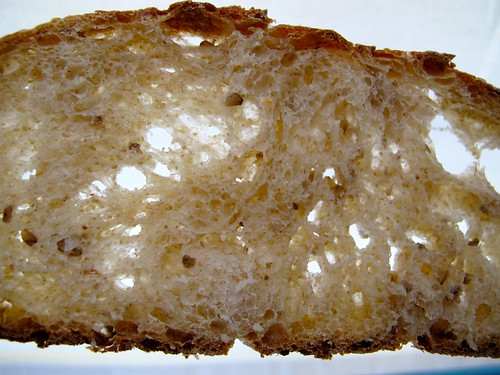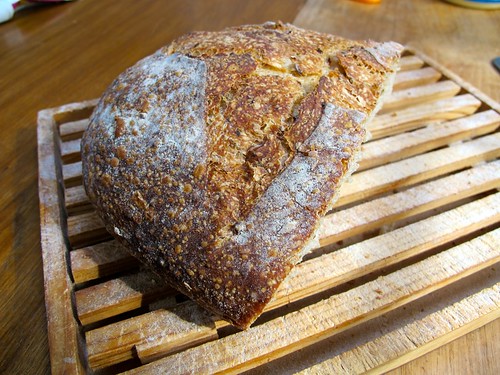Ahhh, beer making. I don't partake of this sport, but my step-mom, Patty, does, with a passion. And I have to say her IPA will put rivals to shame. But here's the thing. She's been brewing this beer for a few years, and even grows the hops in the backyard. I have long wanted to make a bread with the "wort" (that is, the pre-fermented beer) and the "spent grains" (the malted barley soaked in hot water that, with hops, makes the wort). This is the ultimate beer bread and the method goes back to England and Scotland, and probably much earlier historically, considering barley beer and bread built the pyramids.
British baker Dan Lepard explains that the mildly antiseptic qualities of hops prevent the barm leaven from turning sour. This might seem odd, given that hops are bitter, but in a small dose of leaven they actually sweeten the bread.
For the rest of the post on this wonderful bread, see my post on ChewsWise.com.
- Sam Fromartz's Blog
- Log in or register to post comments


What a great bread from spent grains and a little ingenuity. Thanks for sharing the details here. I've been enjoying your blog this past year covering some interesting subjects.
Eric
Oh, how I envy you having a brewer in the family. Great beer and spent grains to bake with - what could be better!?!
I can just imagine the flavor, a real beauty!
Sylvia
Hi highoctane,
you might be just the person to ask. I am looking to purchase some malt grains from a brewer. He said these are germinated barley grains that have been dried. Is that right? I want to grind these into powder to use as diastatic malt (saving me the trouble of germinating and roasting them myself). He also said i can only use pale malt as the other types are non-diastatic.
Interesting abt the wort. So you use the wort in place of all the water in a formula?
Thanks!
Hi Highoctane,
thanks veyr much for your reply. The link is also veyr useful in indicating the level of diastatic power so i know what to look for and what to avoid. I was about to go germinate some rye grains but no need for that now. Only trouble is what i'll do with 1 kg of the stuff when i only use the occasional tablespoon.
Was told that for brewing beer they will remove the husk but from what i've seen, people who grind their own grains at home for baking purposes don't bother with that. I hope i'm on the right track.
sure i'll update you but i don't know if anything demonstrable will come out of it, as in can i really show how much a loaf has been improved by the addition of diastatic malt?? So far i've only used it in bagels. They were tasty enough :)
Have you tried making the barm bread of this thread? You must have all the ingredients on hand to make a tasty loaf.
meanwhile don't know if you've seen this, but i found this veyr useful:
http://www.thefreshloaf.com/node/6567/make-your-own-diastatic-malt
hi highoctane,
just discovered another potential hiccup, see this, another thread where i posted:
http://www.thefreshloaf.com/node/21786/barley-malt-powder#comment-171087
me again. Gee, this is beginning to sound like a monologue, i hope others are not put off.
anyway, highoctane, i have just done a wee bit of reading on brewing and i'm quite envious that you get to experiment with wort. You mention it makes your breads fluffy - i wonder how much of the amylase enzymes are left by the time you're done with the first round of mashing (if that's what it's called), perhaps it's that and the sugar?
don't know if you've seen this thread but a baker in the UK uses ale-barm (and wort) and provides his formula, so you might find this interesting:
http://www.thefreshloaf.com/node/12978/dan-lepard039s-barm-bread-100-sourdough